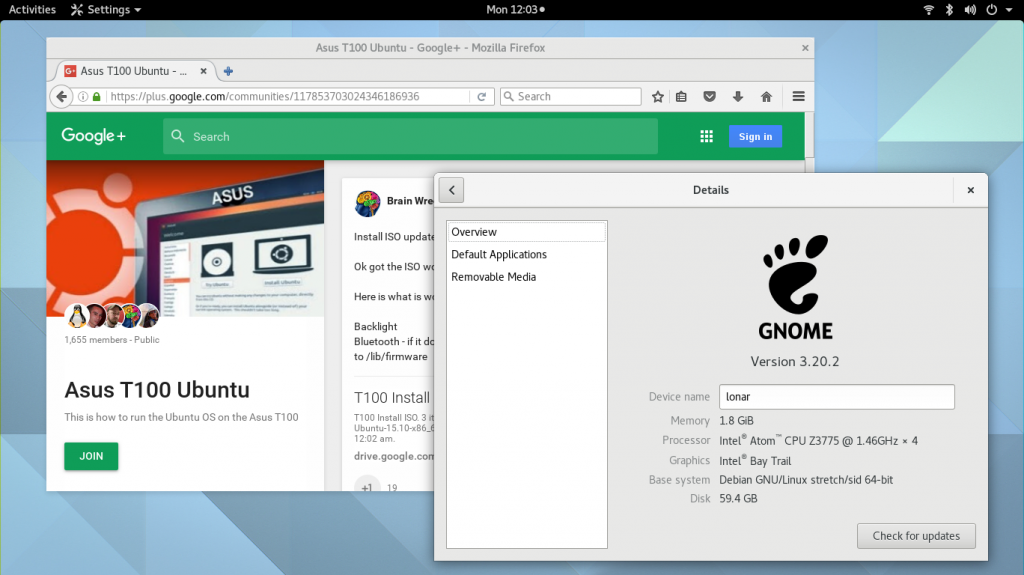After successfully building 32-bit kernels using the Fedora method, I decided to try 64-bit Linux on my ASUS Transformer Book T100TA. The Debian multi-arch installer successfully deals with the 32-bit UEFI boot installation, and even better, certain pre-packaged Ubuntu kernels can simply be installed. Here’s my experience with the upgrade.
I started with the DebianOn ASUS T100TA wiki page. Particularly crucial is the grub command line switch for the cstates issue.
After a bit of trial and error with the install isos— couldn’t locate the correct wifi firmware on the Jessie non-free firmware netinst iso, the Alpha 5 Stretch multi-arch DVD iso would start but never complete the install to the eMMC drive—I settled on the Jessie multi-arch DVD iso with 3.16 kernel. This gave me a running Cinnamon desktop—the iso didn’t contain sufficient packages to switch to GNOME.
I located and installed the wifi firmware according to the wiki page instructions and connected using wpa_supplicant. The upgrade to Stretch and GNOME was a challenge because the wifi connection would drop every few dozen megabytes. It finished after several hours, and I had a running GNOME 3.20 desktop (something I never achieved on the Fedora install). I then…
- switched to NetworkManager and re-installed the wifi firmware (the latter seemed to fix the issue of the connection cutting out).
- installed non-free intel-sound firmware and the t100_B.state file, then applied Vinod Koul’s settings for working audio (be sure to keep the volume down for testing).
- enabled and started ModemManager and installed the mobile-broadband-provider-info package to tether my phone.
The ASUS T100 Ubuntu Google+ community is a volunteer effort geared toward establishing which kernel patches, firmware, and configuration settings are required to get the hardware in the various T100* models working in Linux. Although the stock Debian Stretch kernel (4.5.0) boots with working wifi, the Ubuntu kernel packages from the G+ page (4.4.8.2 and 4.4.9.1) boot with working wifi, sound, mobile broadband, and Bluetooth. There’s still work being done on the camera driver and I haven’t tried anything with the touch screen, but at the moment my GNOME tablet experience is reasonably complete.
Corrections and suggestions welcome.

Great news! Glad you found a way to get this running, I just haven’t had the patience / time for Fedlet lately 🙁
Did yo notice freezes when playing back videos?
There is a long, bad history with a nasty kernel bug on Intel Bay Trail impacting lots of people:
https://bugzilla.kernel.org/show_bug.cgi?id=109051
…with zero support from intel. People thinking on investing time and effort on this platform should probably think it twice
May you can use an Android phone plugin by USB. Works for me almost all the time. This gives me internet access to install a full GNOME Desktop, when installing Debian Jessie.